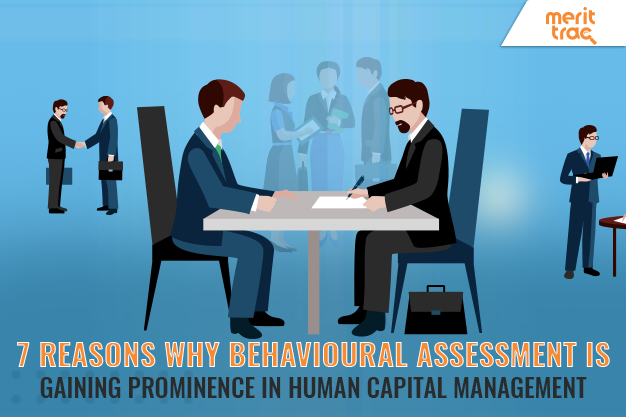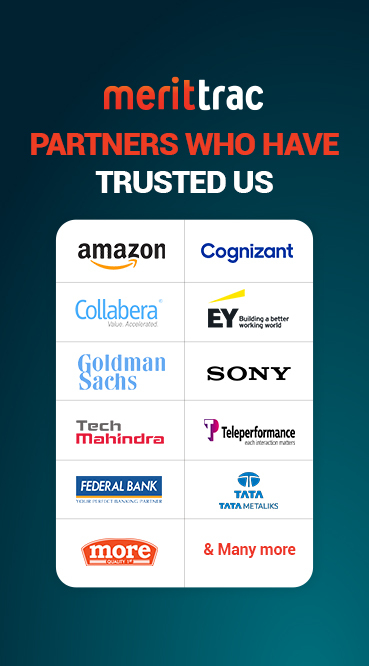
7 Reasons Why Behavioural Assessment is Gaining Prominence in Human Capital Management
Date: 08/03/2018 | Posted by: MeritTrac | Category: Behavioural Assessment , Corporate
World-class companies follow stringent behavioural assessment processes to assess the expertise, experience and abilities of candidates during recruitments. Why? Doing so helps them accurately unearth a candidate’s strengths, weaknesses, preferences, motivation levels, as well as their teamwork skills. It strengthens the decision-making process and mitigates risk of bad hires. According to a survey conducted by Career Builder India, the cost of single bad hire is Rs. 20 lakh. Further, as a result of bad hires, 37% of businesses witness a negative impact on employee morale, 18% on client relationships, and 10% on sales.
Here are seven reasons why behavioural assessment is fast becoming an integral component of Human Capital Management (HCM):
#1 Drives better job fit
How do you ensure that a new hire quickly adapts to the new role and starts contributing to the organisational goals? Preliminary impressions about the candidates based on their resume and interviews are not enough to judge the personality of a candidate. Behavioural assessment helps identify the right individual fit through deep insight into candidate’s preferences and temperament. For instance, behavioural assessment tools can help measure candidates’ personality based on various parameters such as teamwork, responsibility, problem solving capability and flexibility. World-class companies such as Google successfully leverage behavioural assessment to better predict job and cultural fit.
#2 Identifies potential leaders
Identifying candidates who have the right traits to become a leader is not easy. A leader in the making not only needs to have the right expertise but also the right people management skills. Leveraging personality assessment tools is a great way to judge potential candidates on these parameters and create a pipeline of future leaders. Johnson & Johnson and B&Y Mellon identify the right people for each role using Calliper Profile assessment consisting of 150 personality questions and cognitive ability tests.
#3 Enhances retention
Poor hiring decisions are not only costly but also create an unhealthy work environment. Behavioural assessments are an effective tool in understanding if candidates are likely to gel well with the workplace environment and effectively collaborate with their team members. This helps reduce attrition and improve recruitment ROI. For instance, Seaport Hotel and World Trade Center Inc., a Boston-based conference complex integrated a 20-minute behavioural assessment into its online application tool and consequently, was able to reduce its two-digit turnover rate to a single digit . AMC Theatres also witnessed similar success with behavioural assessment solutions.
#4 Ensures a good culture fit
It is important that a new hire seamlessly integrates into the team culture. A collective personality score that can help organisations assess the candidate on interpersonal skills, emotional quotient, teamwork capabilities as well as value and belief systems, is a great way to identify candidates who are congruent with your organisational culture. For instance, Amway and HCL technologies leverage Predictive Index to find right-fit candidates and take more informed decisions.
#5 Improves employee engagement
Assessing personalities can help develop and drive customised strategies to engage employees.
Businesses can take advantage of behavioural assessment tools to comprehend employee skills, motivation, and effectiveness to better connect with their employees, and enhance employee engagement and satisfaction. JP Morgan conducts aptitude and situational judgement tests to gauge candidates’ capabilities.
#6 Supports continuous improvement
About 80% of Fortune 100 companies leverage Myers-Briggs Type Indicator (MBTI) Personality Type Profiling Test to build strong and more effective teams. Routinely gauging employees’ strengths, weaknesses and temperament helps provide continuous feedback for improved work performance. Companies can also use the information gathered from behavioural assessment to support evaluations and professional growth.
#7 Helps create individualised development plans
Employee development is critical to staying competitive in today’s tight labour markets. Personality assessment can help evaluate employee competency and identify gaps. This data is critical to creating tailored career development plans and learning and development initiatives, and effectively mapping an employee’s career trajectory. For instance, Banish uses Myers-Brigg and Disc tests to gauge candidates’ strengths and weaknesses to help create individualised development plan.
With the growing focus on hiring the right-fit candidates and promoting credible employees who can enhance company performance over the long run, a behavioural assessment tool is a must-have to gain a holistic picture of the candidate. Companies leveraging such tools have the ability to generate nuanced reports for quick interpretation and decision-making, enabling them to improve hiring decisions and enhance company success.
Source:
- youtube.com
- wired.com
- bbc.com
- shrm.org
- economictimes.indiatimes.com
- assessmentday.co.uk
- researchgate.net
- blog.mettl.com












 Sales Hotline: USA: +1 646 916 0939 / Others: +91 80619 14700
Sales Hotline: USA: +1 646 916 0939 / Others: +91 80619 14700


